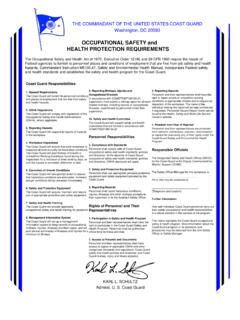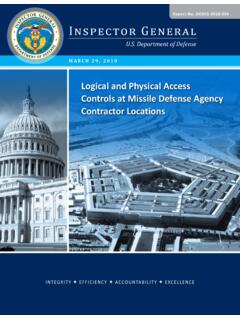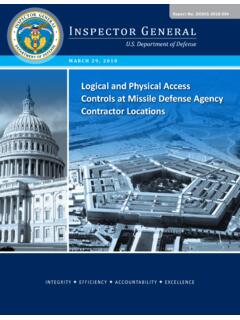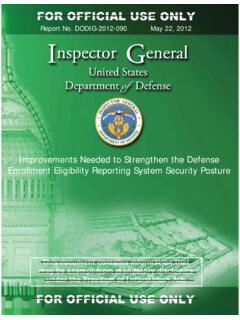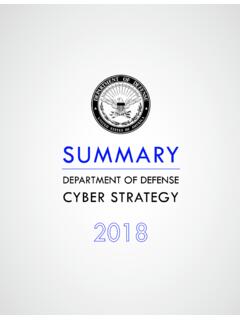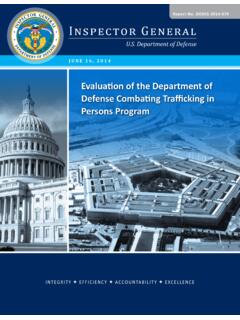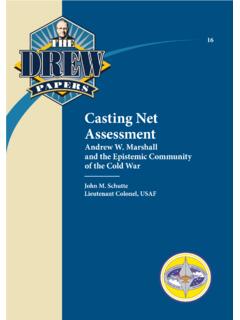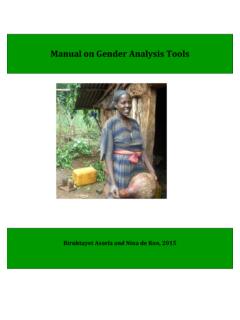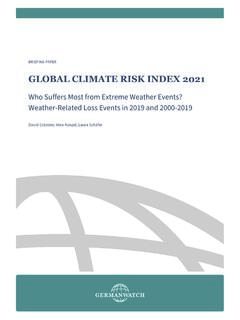Transcription of Mitigating Log4Shell and Other Log4j-Related Vulnerabilities
1 To report suspicious or criminal activity related to information found in this Joint Cybersecurity Advisory, contact the FBI via their victim referral page for Log4j, When available, please include the following information regarding the incident: date, time, and location of the incident; type of activity; number of people affected; type of equipment used for the activity; the name of the submitting company or organization; and a designated point of contact. To request incident response resources or technical assistance related to these threats, contact CISA at For NSA client requirements or general cybersecurity inquiries, contact the Cybersecurity Requirements Center at 410-854-4200 or Australian organizations can visit or call 1300 292 371 (1300 CYBER 1) to report cybersecurity incidents and access alerts and advisories. Canadian organizations can report incidents by emailing CCCS at New Zealand organizations can visit to report incidents.
2 United Kingdom organizations should report a significant cyber security incident: (monitored 24 hrs) or for urgent assistance call 03000 200 973. This document is marked TLP:WHITE. Disclosure is not limited. Sources may use TLP:WHITE when information carries minimal or no foreseeable risk of misuse, in accordance with applicable rules and procedures for public release. Subject to standard copyright rules, TLP:WHITE information may be distributed without restriction. For more information on the Traffic Light Protocol, see Product ID: AA21-356A December 22, 2021 TLP:WHITE TLP:WHITE Co-Authored by: Mitigating Log4 Shell and Other Log4j-Related Vulnerabilities SUMMARY The Cybersecurity and Infrastructure Security Agency (CISA), the Federal Bureau of Investigation (FBI), National Security Agency (NSA), Australian Cyber Security Centre (ACSC), Canadian Centre for Cyber Security (CCCS), the Computer Emergency Response Team New Zealand (CERT NZ), the New Zealand National Cyber Security Centre (NZ NCSC), and the United Kingdom s National Cyber Security Centre (NCSC-UK) are releasing this joint Cybersecurity Advisory (CSA) to provide mitigation guidance on addressing Vulnerabilities in Apache s Log4j software library: CVE-2021-44228 (known as Log4 Shell ), CVE-2021-45046, and CVE-2021-45105.
3 Malicious cyber actors are actively scanning networks to potentially exploit Log4 Shell, CVE-2021-45046, and CVE-2021-45105 in vulnerable systems. According to public reporting, Log4 Shell and CVE-2021-45046 are being actively exploited. CISA, in collaboration with industry members of CISA s Joint Cyber Defense Collaborative (JCDC), previously published guidance on Log4 Shell for vendors and affected organizations in which CISA recommended that affected organizations immediately apply appropriate patches (or apply workarounds if unable to upgrade), conduct a security review, and report compromises to CISA or the CISA | FBI | NSA | ACSC | CCCS | CERT NZ | NZ NCSC | NCSC-UK TLP:WHITE Page 2 of 11 | Product ID: AA21-356A TLP:WHITE FBI. CISA also issued an Emergency Directive directing federal civilian executive branch (FCEB) agencies to immediately mitigate Log4j Vulnerabilities in solution stacks that accept data from the internet. This joint CSA expands on the previously published guidance by detailing steps that vendors and organizations with IT and/or cloud assets should take reduce the risk posed by these Vulnerabilities .
4 These steps include: Identifying assets affected by Log4 Shell and Other Log4j-Related Vulnerabilities , Upgrading Log4j assets and affected products to the latest version as soon as patches are available and remaining alert to vendor software updates, and Initiating hunt and incident response procedures to detect possible Log4 Shell exploitation. This CSA also provides guidance for affected organizations with operational technology (OT)/industrial control systems (ICS) assets. Log4j is a Java-based logging library used in a variety of consumer and enterprise services, websites, applications, and OT products. These Vulnerabilities , especially Log4 Shell, are severe Apache has rated Log4 Shell and CVE-2021-45046 as critical and CVE-2021-45105 as high on the Common vulnerability Scoring System (CVSS). These Vulnerabilities are likely to be exploited over an extended period. CISA, the FBI, NSA, ACSC, CCCS, CERT NZ, NZ NCSC, and NCSC-UK strongly urge all organizations to apply the recommendations in the Mitigations section.
5 CISA, the FBI, NSA, ACSC, CCCS, CERT NZ, NZ NCSC, and NCSC-UK encourage leaders of organizations to review NCSC-UK s blog post, Log4j vulnerability : what should boards be asking?, for information on Log4 Shell s possible impact on their organization as well as response recommendations. Note: this is an evolving situation, and new Vulnerabilities are being discovered. CISA, the FBI, NSA, ACSC, CCCS, CERT NZ, NZ NCSC, and NCSC-UK will update this CSA as we learn more about this exploitation and have further guidance to impart. DISCLAIMER The information in this report is being provided as is for informational purposes only. CISA, the FBI, NSA, ACSC, CCCS, CERT NZ, NZ NCSC, and NCSC-UK do not endorse any commercial product or service, including any subjects of analysis . Any reference to specific commercial products, processes, or services by service mark, trademark, manufacturer, or otherwise, does not constitute or imply endorsement, recommendation, or favoring by CISA, the FBI, NSA, ACSC, CCCS, CERT NZ, NZ NCSC, or NCSC-UK.
6 TECHNICAL DETAILS Log4 Shell Log4 Shell, disclosed on December 10, 2021, is a remote code execution (RCE) vulnerability affecting Apache s Log4j library, versions to The vulnerability exists in the action the Java CISA | FBI | NSA | ACSC | CCCS | CERT NZ | NZ NCSC | NCSC-UK TLP:WHITE Page 3 of 11 | Product ID: AA21-356A TLP:WHITE Naming and Directory Interface (JNDI) takes to resolve variables. Affected versions of Log4j contain JNDI features such as message lookup substitution that do not protect against adversary-controlled Lightweight Directory Access Protocol (LDAP), Domain Name System (DNS), and Other JNDI related endpoints. An adversary can exploit Log4 Shell by submitting a specially crafted request to a vulnerable system that causes that system to execute arbitrary code. The request allows the adversary to take full control over the system. The adversary can then steal information, launch ransomware, or conduct Other malicious activity.
7 CVE-2021-45046 CVE-2021-45046, disclosed on December 13, 2021, enables a remote attacker to cause RCE, a denial-of-service (DoS) condition, or Other effects in certain non-default configurations. This vulnerability affects all versions of Log4j from through and through In response, Apache released Log4j version (Java 8). CVE-2021- 45105 CVE-2021-45105, disclosed on December 16, 2021, enables a remote attacker to cause a DoS condition or Other effects in certain non-default configurations. According to Apache, when the logging configuration uses a non-default Pattern Layout with a Context Lookup (for example, $${ctx:loginId}), attackers with control over Thread Context Map (MDC) input data can craft malicious input data that contains a recursive lookup, resulting in a StackOverflowError that will terminate the process. In response, Apache released Log4j version (Java 8). Impact Log4 Shell and CVE-2021-45046 rated as critical Vulnerabilities by Apache are severe because Java is used extensively across IT and OT platforms, they are easy to exploit, and applying mitigations is resource intensive.
8 Log4 Shell is especially critical because it allows malicious actors to remotely run code on vulnerable networks and take full control of systems. According to public reporting, exploitation of Log4 Shell began on or around December 1, 2021, and a proof-of-concept exploit is publicly available for this vulnerability . The FBI has observed attempted exploitation and widespread scanning of the Log4j vulnerability to gain access to networks to deploy cryptomining and botnet malware. The FBI assesses this vulnerability may be exploited by sophisticated cyber threat actors and incorporated into existing cyber criminal schemes that are looking to adopt increasingly sophisticated obfuscation techniques. According to public reporting, CVE-2021-45046 is being actively exploited as well. CISA, the FBI, NSA, ACSC, CCCS, CERT NZ, NZ NCSC, and NCSC-UK assess that exploitation of these Vulnerabilities , especially Log4 Shell, is likely to increase and continue over an extended period.
9 Given the severity of the Vulnerabilities and likely increased exploitation, CISA, the FBI, NSA, ACSC, CCCS, CERT NZ, NZ NCSC, and NCSC-UK strongly urge all organizations to apply the recommendations in the Mitigations section to identify, mitigate, and update affected assets. For more information on these Vulnerabilities , see the Apache Log4j Security Vulnerabilities webpage. CISA | FBI | NSA | ACSC | CCCS | CERT NZ | NZ NCSC | NCSC-UK TLP:WHITE Page 4 of 11 | Product ID: AA21-356A TLP:WHITE MITIGATIONS Vendors CISA, the FBI, NSA, ACSC, CCCS, CERT NZ, NZ NCSC, and NCSC-UK encourage vendors to: 1. Immediately identify, mitigate, and update affected products that use Log4j to the latest patched version. a. For environments using Java 8 or later, upgrade to Log4j version (released December 17, 2021) or newer. b. For environments using Java 7, upgrade to Log4j version (released December 21, 2021). Note: Java 7 is currently end of life and organizations should upgrade to Java 8.
10 2. Inform your end users of products that contain these Vulnerabilities and strongly urge them to prioritize software updates. CISA, the FBI, NSA, ACSC, CCCS, CERT NZ, NZ NCSC, and NCSC-UK strongly recommend vendors take steps to ensure messaging on software updates reaches the widest possible audience (for example, avoid placing relevant information behind paywalls). Note: CISA is actively maintaining a GitHub page and repository with patch information for products known to be affected by Log4 Shell. CISA has also notified ICS vendors that may be affected and has asked them to confirm any assets affected by Log4 Shell and to apply available mitigations. Affected Organizations with IT and Cloud Assets CISA, the FBI, NSA, ACSC, CCCS, CERT NZ, NZ NCSC, and NCSC-UK recommend that affected organizations take the following steps to patch these Vulnerabilities in their IT and cloud assets and initiate threat hunting to detect possible compromise.
